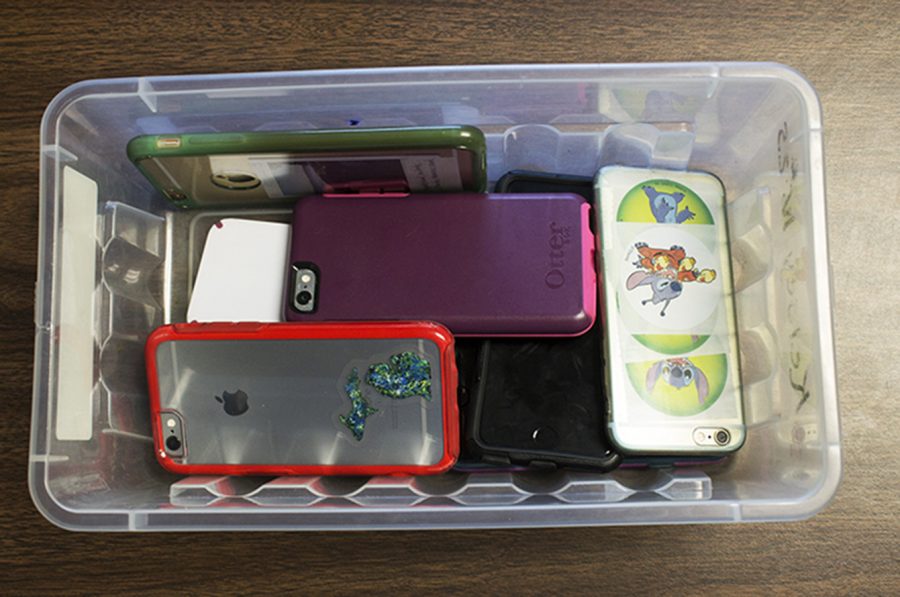Teachers crack down on phone usage
November 3, 2016
Junior Lauren Grandy refers to her cell phone as her “bestie.” When you consider all the uses phones represent today- Twitter, Instagram, Snapchat, calculators, dictionaries, video recorders, texting, calling, emails, alarm clocks- it’s easy to see why.
However, it’s some of these advances in technology that have resulted in many RHS teachers tightening their cell phone policies. Math teacher Lori Smillie discusses the struggle she faces when trying to teach students that have trouble putting their phone way.
“Changes in technology have both helped and hindered the classroom,” Mrs. Smillie said. “It’s extremely powerful to have a projector and document camera to enhance lessons. However, students are so addicted to using their cell phone around the clock, that it’s tough for them to put it away during class and focus on the lesson.”
Mrs. Smillie says that social media usage during class leads to students missing crucial information pertinent to the lesson they are learning. This is why when students enter her classroom, they are given the choice to place their phones in a holder located in the front of the room.
“I am trying to help students help themselves,” Mrs. Smillie said. “I am trying to remove the temptation to use social media or text a friend. You can’t accidentally use your phone if your phone is in the holder at the front of the room. Students don’t need to check social media during the hour, they are there to learn math.”
Some students, such as Junior Kathleen Gerard, disagree with putting their phones in the front of the room. Gerard says that such policies prevent students from using their phone in instances such as small emergencies, where student may need to, for example, text their parents. However, Gerard also recognizes there is a necessity for phone usage restraints, though only to an extent.
“I would change [phone policies] so that you would only have to put your phone on the wall if you’re taking a test or a quiz, but you could keep it out if just doing school work,” Gerard said. “During a lesson you could have it face down on your desk.”
Sophomore Zeeba Ali agrees with Gerard, saying that while some phone policies are a reasonable and essential part of school, others are not.
“I think some teachers are fair, but others will take away [your phone] even if you just have it sitting on your desk, which I don’t think is fair if you’re not touching it. Even if you have it in your pocket, they’ll take it away from you,” Ali said.
The necessity for such policies, according to Mrs. Smillie, stems from students using their phones as ways of cheating. They are sometimes caught taking pictures of assessments to send to their friends, or text each other for the answer to a question. Instead of doing the work, a student may even look up answers online. However, the problems with cell usage in class does not stop at cheating. Mrs. Smillie states that phones distract students, and keeps them from focusing on their work.
“It is really difficult to multitask effectively during class when trying to learn the content in a course and trying to use the phone (between your legs or hidden in your backpack or hidden under your binder) every few seconds,” Mrs. Smillie said. “[Phones] interrupt their focus so much that they really don’t understand what was taught. Students end up catching bits and pieces of what was taught and end up missing on crucial connections.”
Sophomore Tej Seth admits he has trouble staying focused when he uses his phone, so much so that he has to put it in another room when doing homework so he isn’t distracted by its buzzing.
“At home, I really have trouble putting it away when I’m doing homework,” Seth said. “It takes up more time than it should be and I’m up later than I should [be], so I don’t get as good of a sleep the night before a test or something.”
Both Seth and Ali believe that cell phones are unhelpful when it comes to staying focused.
“I think if I were to use my cell phone consistently during class it would be definitely detrimental to my learning, because I wouldn’t be able to concentrate,” Ali said. “At the extent that I think that I’m using it now it’s beneficial because I’ve been able to control it to a point where I’m not really distracted by it and neither are my classmates.”
Ali says that using her phone consistently during class could prevent her from learning to the “fullest extent” possible. Despite this, Ali does believe that cell phones have a wide range of benefits that make her studies easier.
“When I use my cell phone, it’s really just to access things that I wouldn’t be able to have in front of me,” Ali said. “I could just use my phone in order to find research or something, or to listen to music in order to cut the classroom noise around me and be able to focus better.”
Like Ali, Mrs. Smillie recognizes the benefits of having a cell phone in the classroom, despite them diverting a student’s attention away from their work,
“Students can use the camera in the phone to take a picture of class notes when they’ve been out sick or if they know in advance they are going to miss class,” Mrs. Smillie said. “I think in some courses cell phones are extremely helpful because students need easy access to the internet.”
Internet usage is especially important to Grandy, who uses her phone to look up things she’s unfamiliar with. Because of this, Grandy expresses that she feels cellphones are extremely beneficial to her learning.
“I need to be able to use my phone. I need to be able to know what’s going on. I need to be able to research things that we’re doing in class,” Grandy said. “Sometimes teachers will ask us to get phones out for maybe a Kahoot quiz or looking up vocab word on the internet, so it’s a lot faster than dictionaries.”
Overall, Grandy, Gerard, Seth, Ali and Mrs. Smillie agree that the overuse of cellphones can be disastrous, as it distracts students from their work and limits the amount of information they are able to learn. However, phones do have a place in the classroom and can enhance learning.
“I feel like [phone usage] is both beneficial and detrimental because it can enhance kids learning,” Gerard said. “The more as smartphones get higher in technology, it can help kids even more during school. But I do think they have their cons when it comes to test and quizzes because a lot of people can copy, and especially with the SATs and the ACTs, it’s really important to grasp a handle on the usage of cell phones but also not be too strict.”









